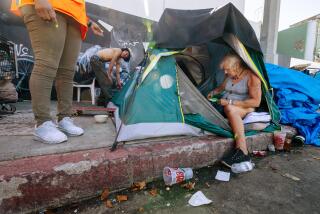THE OLYMPICS : WINTER GAMES AT ALBERTVILLE : They Will Be Happy to Be Little Ol’ Albertville Again : Hosts: The town of 18,000 waits for the storm of Olympic attention to end.
ALBERTVILLE, France — For this town of 18,000, its day in the snow is drawing to a close, which means that by next week, the center of the Winter Olympics will be what it was before.
And what is that?
“Just a little town,” said Agnes Chappelet, assistant to Mayor Henri Dujol.
But Les Jeux Olympiques d’Hiver have meant that for two weeks, this place didn’t seem very small at all.
Although there are Olympic venues in a number of towns in the French Alps, Albertville is the newspaper dateline that most of the world has come to recognize as the official host of the 16th Winter Olympic Games.
The town named for King Charles-Albert of the House of Savoy, nestled at the intersection of four valleys connected by a Roman highway, seems to have settled comfortably into its niche in history.
Fame of some sort arrived on skis.
“Before, we were only famous for our traffic jams,” Chappelet said.
Rue de la Republique, the city’s central street, was bustling with activity the other day. The main drag is one lane wide, and cars jockeyed for position with pedestrians who spilled over from the sidewalks.
Dutch fans with wooden shoes, Swedish fans with painted faces and Norwegian fans carrying flags strolled along the Rue de la Republique on their way to the speedskating venue.
They passed scores of small businesses with their window fronts stocked with Olympic souvenirs. Rock music blared from the Stoc Supermarche, a supermarket, where customers lined up for cheese and baguettes. And, of course, there were the ever-present pin trading stands.
At Mister Music, the store was filled with drums, keyboards, guitars and trading pins, which are never out of tune for souvenir-hunters.
One sidewalk vendor was selling worn-out shoes filled with dried flowers. You could buy a pair of authentic Savoy galoshes with dried flowers for only 200 francs, about $40. The same shoes without the flowers cost 100 francs.
Those who did not place a premium on souvenir value could buy a new pair of authentic Savoy leather shoes at Pieds Sensibles for 190 francs. Presumably, the dried flowers were extra.
At the jardin public, the public garden, children rode their bicycles in a reflection pool drained for the winter. Farther up the street, a vendor sold barbapapa, or cotton candy, for 10 francs, about $2.
Parents probably noted that the dentist’s office was a few doors down.
Suzanne Pachoud, who has lived here for 25 years, is a cashier in a variety store on Rue de la Republique. Business has been “tres, tres bon, “ she said.
“People are buying pins, spoons, glasses, everything,” Pachoud said. “Les Jeux have been very, very good, I think.”
Farther down the street at the pub Le Gaulois, owner Rene Perret said his business has been brisk for more than two months. Perret, the third generation of his family to operate the pub, said the top spenders at Le Gaulois have been Americans.
“I think the Americans have the Olympic spirit,” said Perret, who noted that much of it has been enjoyed in liquid form.
Perret showed no reluctance to shower himself in his own Olympic spirit. Outside the bar, a favorite watering hole for the French hockey team, he set up a portable bar and a television set tuned to the Winter Games.
Perret also rented a tent and set up a restaurant serving fondue. He has invested $30,000 in that operation. “So it’s a challenge,” he said. “If it’s good, I don’t know. But I don’t want to say after the Olympics that I didn’t try.”
If, however, the Olympics-related businesses are prospering because of the Games, many of the city’s other merchants are not.
Store owners complain that their normal customers are not shopping, that they have been scared away by fears of a tourist avalanche causing gridlock on the streets, soaring prices and no place to park.
“Some things we have no control over, like the weather,” Chappelet said. “We thought that a lot of people would come into the city, but last week, it was very quiet. They were afraid.
“They bought lots of food before the Olympic Games so they could stay in their houses. This means that people from here stay at home and people from their homes nearby don’t come.
“But now, it is OK,” she said. “Before, people were afraid because it was a very quiet city.”
The sun shone brightly on this particular day, and traffic of all kinds--pedestrian and vehicular--clogged the streets.
The city seemed to be in a lighthearted mood. A band of about two dozen clarinet-playing Frenchmen playfully surrounded a woman trying to make a call in a telephone booth. A crowd quickly gathered and laughed at her predicament.
Soon the music will be over, but even when the last note sounds, the city will probably continue to enjoy what the Olympics brought--a new train station, a new hospital, a new stadium, a new police station and a new highway from Montmelian, about 35 miles away.
Chappelet said she hopes the Winter Games come back sometime.
“But not until I get some sleep,” she added.
More to Read
Go beyond the scoreboard
Get the latest on L.A.'s teams in the daily Sports Report newsletter.
You may occasionally receive promotional content from the Los Angeles Times.






